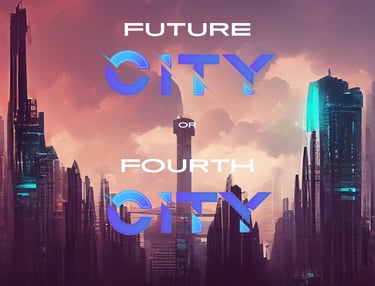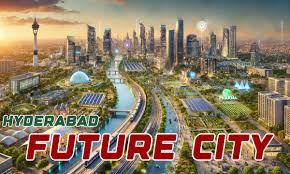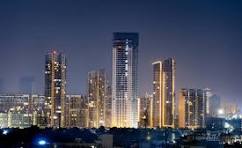THE FUTURE CITY OF HYDERABABD
The Future City of Hyderabad refers to a well-planned, high-tech, and sustainable urban development aimed at modernizing infrastructure, improving connectivity, and creating an innovation-driven ecosystem. It focuses on integrating smart technologies, green energy, efficient transport, and economic hubs to support the city's expanding population and industries.
FLIXAH DEVELOPERS
3/16/20253 min read


The Future City of Hyderabad: A Vision of Growth and Innovation
Hyderabad is rapidly transforming into one of the most dynamic cities in India, driven by innovation, infrastructure, and technology. With government initiatives and strategic urban planning, Hyderabad is on its way to becoming a “Future City” that balances growth with sustainability.
What is the Future City of Hyderabad?
The Future City of Hyderabad refers to a well-planned, high-tech, and sustainable urban development aimed at modernizing infrastructure, improving connectivity, and creating an innovation-driven ecosystem. It focuses on integrating smart technologies, green energy, efficient transport, and economic hubs to support the city's expanding population and industries.
Why Hyderabad is Emerging as a Future City?
Hyderabad's transformation into a future city is driven by several factors:
Rapid Urbanization: A growing population and increased migration require better infrastructure.
Economic Growth: A booming IT, biotech, and pharmaceutical industry.
Government Support: Policies favoring development and foreign investments.
Strategic Location: Well-connected by road, rail, and air.
Smart City Initiatives: Implementation of AI, IoT, and digital governance.
Key Features of the Future City
Smart Infrastructure: AI-driven traffic management, smart grids, and automated systems.
Eco-Friendly Development: Green buildings, solar energy, and water conservation.
Efficient Public Transport: Metro expansion, EV-friendly policies, and dedicated cycling lanes.
Business and Tech Hubs: IT parks, innovation clusters, and co-working spaces.
Digital Governance: Seamless e-governance for faster public service delivery.
Where is the Future City Being Developed?
The expansion areas around Hyderabad that are shaping the future city include:
Pharma City - A global hub for pharmaceutical industries.
Financial District - A thriving business ecosystem.
Aerocity near RGIA - A global aviation and commercial hub.
Yadadri and Surrounding Areas - Expanding urban zones with integrated townships.
Regional Ring Road (RRR) Corridor - Key infrastructure to connect new economic hubs.
Government Initiatives and Policies
The Telangana government has introduced several policies and initiatives to support the development of Hyderabad’s Future City:
TS-iPASS: A single-window clearance for industries.
Look East Policy: Encouraging IT expansion to the eastern parts of Hyderabad.
Strategic Road Development Plan (SRDP): Improving road networks.
Hyderabad Pharma City: World’s largest integrated pharma cluster.
Electric Mobility Policy: Promoting EV infrastructure and manufacturing.
Infrastructure and Connectivity
Metro Expansion: Extending metro connectivity to growing regions.
Elevated Corridors: Reducing traffic congestion.
Regional Ring Road (RRR): Connecting industrial zones to the city.
High-Speed Rail & Airport Connectivity: Making Hyderabad a global transit hub.
Technology and Smart City Integration
Hyderabad’s smart city initiatives focus on:
IoT-Based Traffic Systems: AI-powered traffic monitoring.
E-Governance: Digital solutions for public services.
Blockchain & AI Innovation Hubs: Attracting global technology firms.
5G Implementation: Enhancing digital connectivity.
Real Estate and Urban Development
High-Rise Smart Apartments: AI-enabled security, automated energy management.
Township Development: Self-sustained communities with smart amenities.
Commercial Expansion: More business districts and tech parks.
Luxury and Affordable Housing: A balanced residential market.
Environmental and Sustainable Development
Green Energy Adoption: Solar farms, wind energy, and hydro projects.
Waste Management Solutions: Advanced recycling and waste-to-energy projects.
Lake Restoration Projects: Revival of water bodies and sustainable water use.
Plantation Drives: Aiming for increased green cover.
Advantages of the Future City
1. Economic Growth
Increased job opportunities in IT, biotech, pharma, and finance.
Attracts foreign investments and boosts startups.
2. Better Quality of Life
Advanced healthcare facilities and world-class education institutions.
Improved public safety and digital governance.
3. Efficient Transportation
Reduction in travel time with metro and smart road networks.
Environment-friendly public transport options.
4. Technological Advancements
AI, blockchain, and smart city projects enhance governance and services.
Disadvantages and Challenges
1. Overpopulation
Increased migration may put pressure on resources.
2. Environmental Concerns
Large-scale construction may impact biodiversity.
3. High Cost of Living
Real estate and rental prices may rise drastically.
4. Infrastructure Delays
Bureaucratic hurdles and land acquisition challenges may slow progress.
Comparing Hyderabad to Other Global Future Cities
City
Key Features
Hyderabad
IT Hub, Smart City, Green Energy, Smart Transport
Dubai
High-tech architecture, tourism, AI governance
Singapore
Sustainability, automated transport, digital economy
Tokyo
Robotics, high-speed transport, innovation hubs
Expected Timeline and Completion Goals
2025: Completion of key infrastructure projects.
2030: Full integration of smart city technologies.
2040: Hyderabad to become one of the top smart cities globally.
The Future City of Hyderabad is set to redefine urban living with its smart technologies, sustainable growth, and economic opportunities. While challenges exist, proactive planning and execution will ensure Hyderabad remains a global powerhouse in the coming decades.
FAQs
1. What is the main goal of Hyderabad’s Future City project?
To develop a smart, sustainable, and technologically advanced urban ecosystem.
2. Where is Hyderabad’s Future City being developed?
Expansion is happening in Financial District, Pharma City, Aerocity, and RRR Corridor.
3. How will the Future City impact Hyderabad’s economy?
It will boost employment, foreign investments, and industrial growth.
4. What challenges does the Future City face?
Overpopulation, infrastructure delays, environmental concerns, and rising costs.
5. When will Hyderabad’s Future City be fully developed?
The city is expected to reach full smart city integration by 2040.




